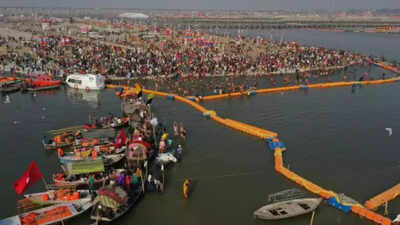
pray: To keep the Sangam (the confluence of the Ganges, Yamuna and the mythical Saraswati) clean and sacred, Kumbh Mela Management Ready to deploy 500 dedicated ganga praharis.
As the date of Mahakumbh 2025 gets closer and the flow of devotees increases day by day, these Ganga Praharis will also act as vigilant guardians River cleanliness 24/7.
Sangam city has about 25 ghats, and devotees will flock to them in large numbers during Mahakumbh. Keeping these ghats, as well as the Ganges and Yamuna rivers clean, is undoubtedly a major challenge for the Mehra government.
However, the Ganga Praharis stationed at each ghat are steadfast in fulfilling their commitments. Working in groups of 15 to 20 people at each ghat, they work in shifts during Mahakumbh, not only cleaning the river and ghat but also educating pilgrims on the importance of preserving the sanctity of the river.
In addition, more than 200 specially trained Ganga Praharis personnel from across the country have been deployed to ensure that there is no shortage of manpower for this mammoth job.
Down South China Sea Ganges River Project In Prayagraj, ‘Ganga Praharis’ in collaboration with the Wildlife Research Institute are working to ensure cleanliness of rivers and ghats while protecting aquatic life.
Jalaj Yojana Assistant Coordinator Chandra Kumar Nishad stressed that millions of people bathe in the Ganges and Yamuna and unclean water weakens their faith.
He said, “To prevent this, teams conducted round-the-clock cleanliness drives using nets to remove waste from rivers and ghats. They also educated devotees to maintain cleanliness and not to throw waste or garlands in rivers. If garbage After being discarded, they will be promptly recovered using Turannet and other tools.
He added: “Former predators of aquatic creatures such as turtles and dolphins now become their protectors, leading to an increase in the numbers of these species, which play a natural role in keeping rivers clean.”
Through the Arth Ganga Yojana (Jalaj Yojana) initiative, local women receive free training in skills such as sewing, beauty services and making incense sticks and jute bags. More than 700 women from 100-150 villages have participated in these training programmes.
Meanwhile, during Mahakumbh, men are assigned tasks outside of their traditional diving roles and receive financial assistance and honoraria. These measures reduce communities’ dependence on the river, transforming them into active stewards of river protection.
Nishad also emphasized that the “Ganga Praharis” received comprehensive training from Mahakumbh. In addition to ensuring a clean event, they will guide pilgrims to facilities, assist those who are lost, and direct them to lost and found centers.
Additionally, the team will monitor the ghats along with security personnel to respond promptly to emergencies and ensure the safety and well-being of bathers.







